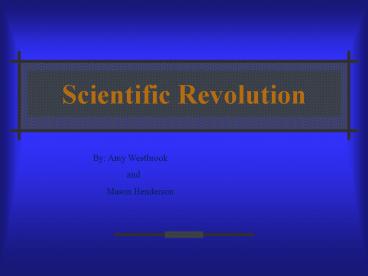Scientific Revolution - PowerPoint PPT Presentation
1 / 23
Title:
Scientific Revolution
Description:
He wrote the revolutionary texts, De humani corporis fabrica on the human body. ... Come up with a theory and Made people realize what the constitution of stars was. ... – PowerPoint PPT presentation
Number of Views:43
Avg rating:3.0/5.0
Title: Scientific Revolution
1
Scientific Revolution
By Amy Westbrook and
Mason Henderson
2
Andreas Vesalius
- Born in 1514
- Lived in Brussels
- Studied anatomy and physics.
- Died in 1564
3
Education and Contributions of Andreas Vesalius
- Education
- Vesalius attended university of Louvain.
- Later attended university of Paris.
- Studied for 3 years on medicine and developed an
interest in anatomy. - Vesalium obtained his medical degree and a job as
a lecturer on surgery.
- Scientific Revolution
- He wrote the revolutionary texts, De humani
corporis fabrica on the human body.
4
Technological Advances of the Scientific
Revolution
- These were the most accurate and comprehensive
anatomical text to date and led to his
appointment as physican to the holy roman emperor
Charles v. - EFFECTS ON ENLIGHTENMENT
- Helped enlightenment thinkers become smarter on
parts of the human body.
5
William Harvey
- Born 1578
- Died 1657
- From He lived in England most of his life.
- Science He studied Physics
6
Education and Contributions of William Harvey
- EDUCATION
- He attended Cambridge University and Studied
Physics at the University of Padua.
- CONTRIBUTIONS
- William Harvey discovered the reproduction of
humans and mammals while at the University of
Cambridge.
7
Technological advances of the scientific
revolution.
- He had a thought out a theory on human and mammal
reproduction and his theory was so well thought
out everyone assumed it was right. - Effects on Enlightenment
- He helped people understand the reproductive
system and the way reproduction works.
8
Carolus Linnaeus
- Born May 23,1707
- Died January 10, 1778
- From Sweden
- Science Botany
9
Education and Contributions of Carolus Linnaeus
- EDUCATION
- Entered the university of Lund in 1727 to study
medicine. - And then later transferred to the university of
uppsala the most prestigious university of Sweden
where he collected and studied plants.
- Contributions
- Presented his classification of plants largely on
basis of the number of stamens and pistil in the
flower.
10
Technological advances of the Scientific
revolution
- Establish the modern binomial system of
nomenclature for plants and animals. - ENLIGHTENMENT
11
Nicolous Copernicus
- Born Feb 19, 1473
- Died May 24, 1543
- From Torun, Poland
- Science Copernicus studied Astronomy
12
Education and Contributions of Nicolous Copernicus
- Education
- He attended the university of Krakow.
- He studied art at Bologna and medicine at padua.
- Contributions
- The enucation of the heliocentric theory was his
contribution to the scientific revolution. - Copernicus marked the beginning of the scientific
revolution
13
Technological advances of the scientific
revolution
- Copernicus agreed to commit to print the theory
already outlined in 1514. - Effect of the Enlightenment
- Helped people think more about astronomy and
science.
14
Galilei Galileo
- Born Feb15, 1564
- Died Jan 8, 1642
- From Pisa (now Italy)
- Science He studied Philosophy
15
Education and Contributions of Galileo
- He enrolled in the university of Pisa to reserve
his medical degree. - He later received his degree and went to work at
a medical hospital.
- He wrote his first scientific book which
described Archimedes method of finding specific
gravities.
16
Galileos Technological advances to the
Scientific Revolution
- He proved that the milky way was made up of tiny
stars. - Effects on the Enlightenment
- Come up with a theory and Made people realize
what the constitution of stars was.
17
Isaac Newton
- Born Jan 4, 1643
- Died March 31, 1727
- From England
- Study of Science Philosophy
18
Education and contributions
- Education
- Went to Cambridge university and got his science
degree.
- Contributions
- He recorded his thoughts in a book Questions
called Quaestiones Quadam Philosophicae.
19
Technological advances to the scientific
revolution.
- Newton was introduced to the most advanced
mathematical texts by his studies. - Enlightenment
- He brought a new way of studying mathematics to
the world.
20
Johannes Kepler
- Kepler was born on December 27,1571 he died on
November 15,1630. - He was from Germany and studied astronomy and
Arithmetic.
21
Education and Contributions
- Education
- He entered the University of Tubingen.
- Contributions
- He had the first cosmological model
22
Technological advances to the scientific
revolution.
- His model was suppose to replace the planets but
with less space between them. - Enlightenment
- He helped people understand more about the
planets and space.
23
THE END








![[PDF] DOWNLOAD Homo Sapiens Rediscovered: The Scientific Revolution Re PowerPoint PPT Presentation](https://s3.amazonaws.com/images.powershow.com/10088173.th0.jpg?_=20240729066)






















